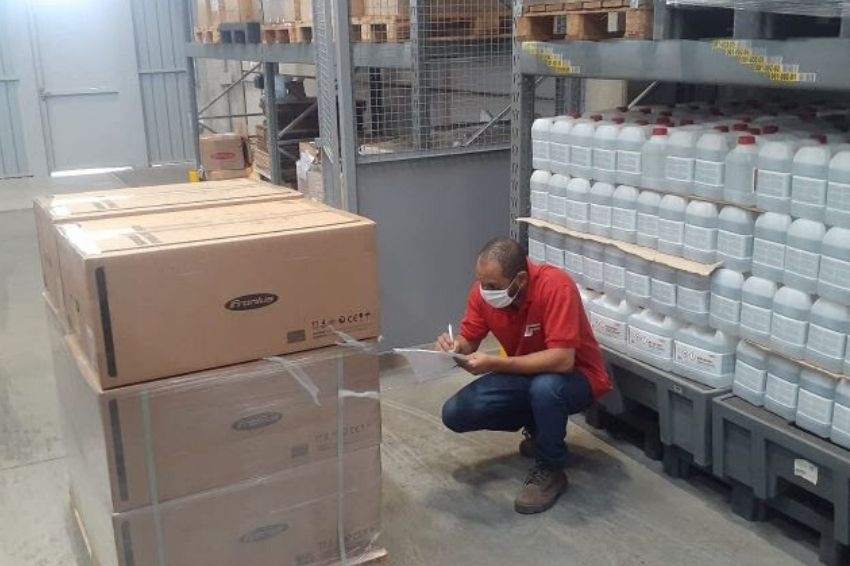Since the quarantine was declared in Brazil, companies in the solar energy sector have been adopting contingency actions against the spread of the coronavirus pandemic. Many employees, for example, went to work from home, and those who work in areas of operations and logistics, the industries doubled their sanitary measures.
Go Solar, a business unit focused on the photovoltaic segment of Golden Distribuidora, has 200 employees, 170 of whom were directed to work from home, especially those who use public transport and those who are part of or have family members in the risk group . For the other 30 who remained in the operations and logistics areas, the company reinforced the use of alcohol gel at all tables, hand hygiene, opened windows and turned off the air conditioning system.
“The beginning had a little more influence on people's psychological adaptation to the moment, the new reality where everything is different and the anxiety of not knowing what would come next. But as the days went by, we organized ourselves better, anxiety reduced and everyday life entered a new phase”, highlighted Davi Saadia, CEO of Golden Distribuidora and Go Solar.
Golden Distribuidora recorded just one case of Covid-19 among employees who stayed in the office. “We diagnose very quickly. The person was isolated for the period advised by doctors and is now able to work normally”, said Saadia.
Fronius, a company dedicated to innovative solutions in the solar energy, battery chargers (automotive and traction) and welding technology segments, has also adopted preventive measures against Covid-19.
Since March 19th, they have decreed full home office for all employees who have activities that can be carried out remotely, with the exception of those who work in the areas of logistics operations and repair. Security measures were increased with the adoption of the use of masks, alcohol gel and an intensification of the cleaning routine of the facilities, in addition to ensuring the necessary social distancing at all times of the day.
The company also sent ergonomic chairs and IT equipment to employees' homes, where everyone is receiving the necessary technical support to carry out their activities. Daily, the leadership team also holds online meetings to make decisions and create action plans.
“We continue in our mission to be a Great Place to Work, so we put our people and their safety first. Since the beginning of the pandemic, we have acted with great responsibility to guarantee the integrity of our employees, families and partners and not lose our essence of unity and teamwork”, concludes Monalisa Gomes, executive director of Fronius do Brasil.

More actions
BYD, a global manufacturer of lithium-iron batteries and electric and plug-in vehicles, has also been following this coronavirus prevention curve. Among the various measures being taken, the company is carrying out screening with temperature measurement at the entrance of shifts, carrying out sector training – warning about precautions to take to prevent this – as well as hygiene care, use of masks and sending information on the online wall.
Quarantine opens doors to online courses
Due to the quarantine caused by the coronavirus pandemic, companies in the solar energy sector are holding online courses to maintain the content of classes that were being held in person. As is the case with Solar Channel, which, in addition to promoting contingency actions against Covid-19, such as the adoption of home office for employees, is offering classes in virtual and live format.
“We put the safety of our employees and customers at the forefront. We carried out a consultation with our students and many liked the idea of online courses in real time, ensuring interaction with teachers through our digital platform. There is still a large audience that wants in-person courses. We believe in this and will resume this modality when health issues allow. However, there is an audience that can adapt well to online and learn remotely”, said Bruno Kikumoto, director of Canal Solar.
Kikumoto also highlighted the frequency of carrying out webinars, which were intensified so that students and clients could have closer contact with prominent professionals in the sector. “People have given us a lot of positive feedback, saying that they are always looking forward to the webinars on Tuesdays and Thursday afternoons”, he emphasized.
Another action that the company has been promoting is the discount on all courses, given the crisis scenario that the country is experiencing. “We see that the revenue of some companies ended up falling. Furthermore, we have a large number of students who are self-employed professionals. So, understanding this scenario, we started offering a discount of 30% on our courses. Even, depending on the schedule of some students, who planned for the medium and long term, we offered a 50% discount. Basically, we are adjusting our operations and the offering of our services so that they can adapt to this new reality”, concluded Kikumoto.
















